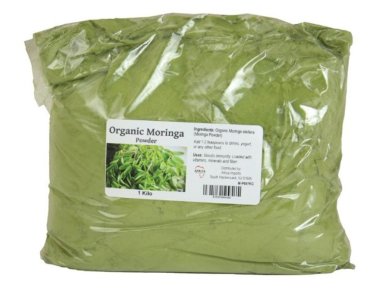
If you’re someone who likes to sprinkle a little extra goodness into your morning smoothie or porridge, you might want to check your pantry—especially if you’ve recently picked up a wellness supplement from Walmart, Amazon, Target, Etsy, eBay, and more..
A popular “superfood” product, often praised for its health-boosting benefits, has just been recalled due to a serious contamination risk. While it’s marketed as a clean and nutritious addition to your daily routine, recent tests revealed it may contain harmful substances that could pose health threats to unsuspecting consumers.
Whether you're a seasoned health enthusiast or just dabbling in better-for-you ingredients, this alert is worth your attention.
What’s happening and why should you care?
Let’s face it—many of us have woven supplements and superfood powders into our daily routines, hoping to boost energy, strengthen immunity, or simply feel a little healthier.
Moringa, in particular, has gained a loyal following for its nutrient-dense profile, rich in antioxidants and essential vitamins. But a recent recall is a stark reminder that even the most celebrated wellness products can carry hidden risks.
Two brands have voluntarily pulled their moringa leaf powders from shelves after testing revealed potential Salmonella contamination. The affected products were sold through major retailers like Amazon and Walmart, prompting renewed scrutiny of the safety standards behind popular health supplements.
While moringa’s benefits are widely touted, this incident raises a critical question: how well are these products regulated, and what dangers might be lurking behind the “natural” label?
For those who regularly reach for herbal powders and wellness boosters, it’s a timely wake-up call to stay informed, read labels carefully, and prioritize safety alongside nutrition.
[photo]
What is salmonella and why is it dangerous?
Salmonella remains one of the most common sources of food-related illness, and while many people recover without medical care, the infection can pose serious risks—especially for older adults and those with compromised immune systems.
According to the Centers for Disease Control and Prevention (CDC), symptoms of Salmonella typically appear within six hours to six days after exposure and may include diarrhea, fever, abdominal pain, nausea, and vomiting. These symptoms often resolve within a week, but for vulnerable individuals, the infection can escalate into more severe health issues.
In rare cases, the bacteria can move beyond the digestive system and enter the bloodstream, potentially leading to arterial infections, inflammation of the heart’s inner lining (endocarditis), or reactive arthritis. These complications are more likely to affect infants, seniors, and people with chronic health conditions.
If you’ve recently used any of the recalled moringa leaf powders and are experiencing persistent gastrointestinal symptoms, high fever, or signs of dehydration, it’s important to consult a healthcare provider.
The CDC recommends seeking medical attention if symptoms last longer than two days, involve blood in the stool, or include a fever exceeding 102°F (38.9°C).
Which products are affected?
The recent recall affects the following moringa-based products distributed by these two companies:

- Africa Imports: Their Organic Moringa Leaf Powder packaged in 1kg boxes is included in the recall. This applies to all purchases made after June 5, 2025.

- Food To Live: The recall covers a wide selection of Organic Moringa Leaf Powder sizes—8oz, 1lb, 2lb, 4lb, 8lb, 16lb, and 44lb bags—as well as their Organic Supergreens Powder Mix in 8oz, 1lb, 1.5lb, 3lb, 6lb, and 12lb bags. Affected products carry lot codes ranging from SO-69006 to SO-72558, which can be found printed on the back of each bag.
Also read: Popular dietary supplement recalled over salmonella outbreak—check if yours is affected.
How did this happen?
Although investigations are ongoing, early signs suggest the contamination may have originated from a supplier.
This incident adds to a growing list of recent food recalls linked to bacterial threats like Listeria.
Both the Food and Drug Administration (FDA) and CDC are actively investigating the reported incidents.
Where were these products sold?
Moringa and supergreens powders have been broadly accessible both in the US and through global e-commerce channels.
Africa Imports primarily offered its products through its own website, whereas Food To Live made theirs available not only on their website, but also across popular online marketplaces such as Amazon, Walmart, Target, Etsy, and eBay.
If you've recently purchased these types of supplements online, it's a good idea to review the brand and lot number to ensure product safety and authenticity.
How to request a refund or replacement
Africa Imports
If you’ve purchased the recalled Organic Moringa Leaf Powder from Africa Imports, the company is offering refunds or replacements. To begin, safely dispose of the product, then confirm your disposal by replying to the recall notification email or contacting the company directly.
You can reach Africa Imports by emailing [email protected] or calling (201) 457-1995 x236.
Once your disposal is confirmed, they’ll walk you through the next steps to receive your refund or replacement.
For additional support, you may also contact Wayne Kiltz, president of Africa Imports, using the same contact details.
Food To Live
If you have any of the affected products from Food To Live, stop using them immediately. You may either discard the item safely or return it to the store where it was purchased for a full refund.
For online orders, contact Food To Live directly to request a refund or replacement. You can reach their customer service team by phone at (718) 717-1029, Monday through Friday from 8:00 AM to 5:00 PM EST, or by email at [email protected].
What should you do next?
A recent product recall has raised concerns over potential Salmonella contamination in certain moringa and supergreens powders. If you’ve purchased these items, it’s important to act quickly to protect your health and prevent further exposure.
- Check your pantry: Look for any moringa or supergreens powders from the brands and lot numbers listed above.
- Stop using affected products: Dispose of them safely, and don’t try to “use them up” or give them to someone else.
- Contact the company: Request a refund if you have an affected product.
- Monitor your health: If you develop any symptoms of Salmonella infection, especially if you’re in a higher-risk group, see your doctor promptly.
A word on food safety for over 60s
As we age, our immune defenses naturally weaken, leaving us more vulnerable to foodborne infections. Staying informed about recalls, practicing good hygiene with food and hands, and being selective with supplements—especially those purchased online or internationally—can help reduce your risk.
We’d love to hear from you!
Have you had experiences with supplements—good or bad? Do you have any tips for staying safe when shopping for health foods? Share your experiences and advice in the comments below—your story could help another member of our community stay safe and healthy.
And remember, The GrayVine is here to keep you informed and protected. Stay tuned for more updates on other important health news!






